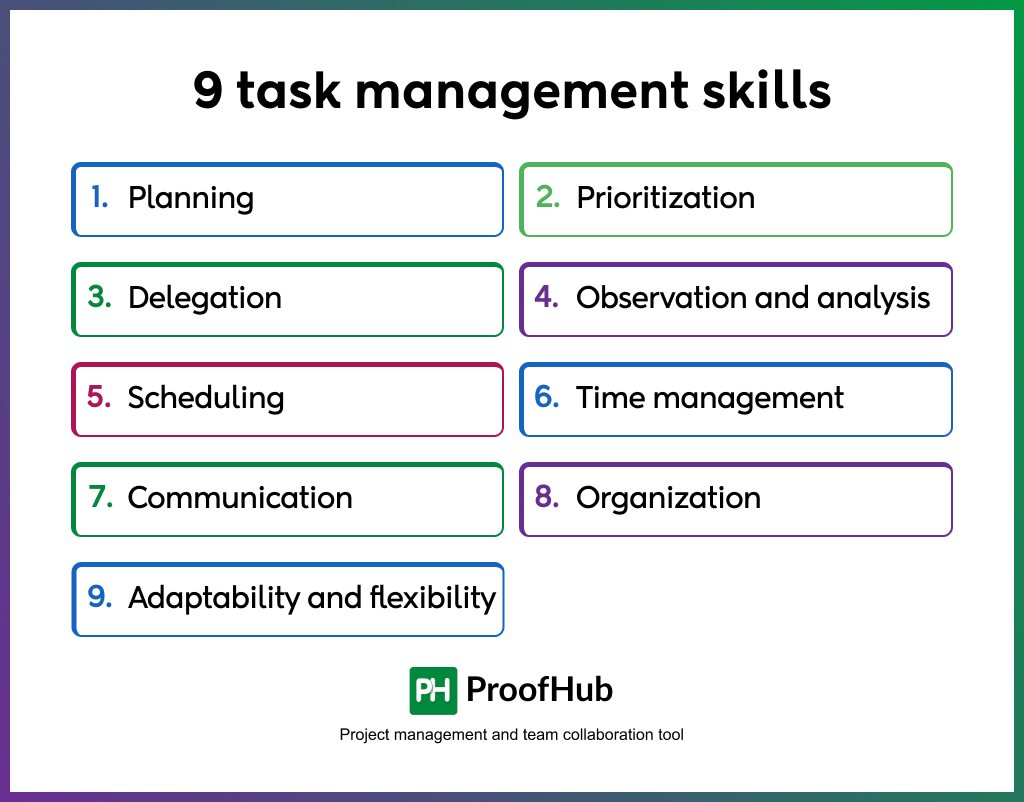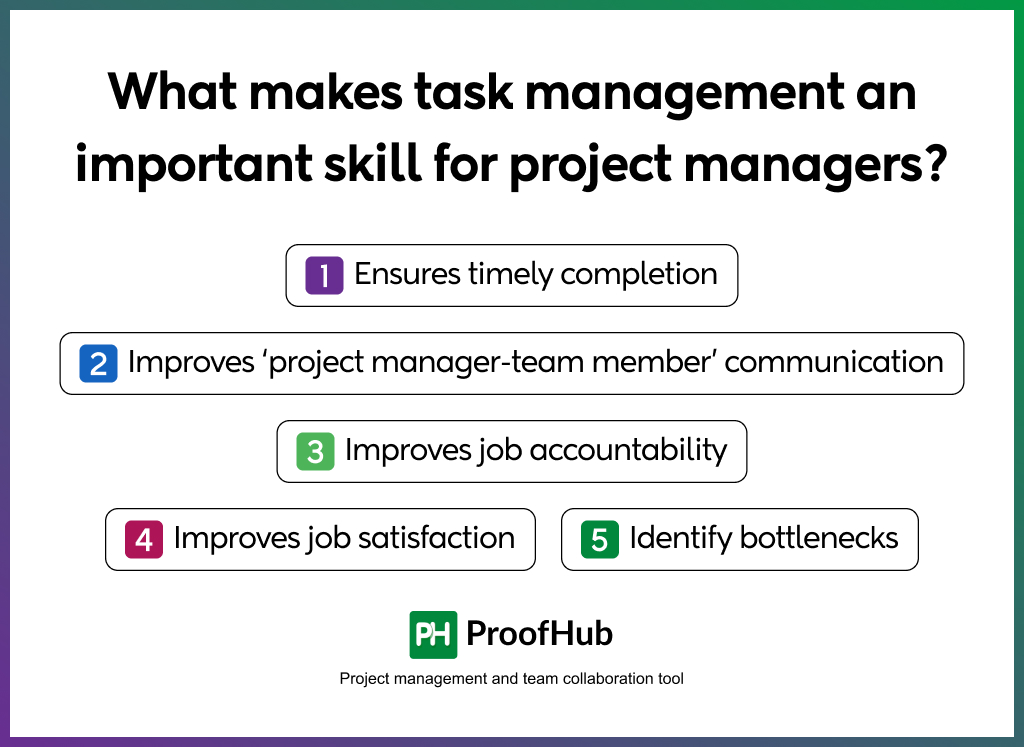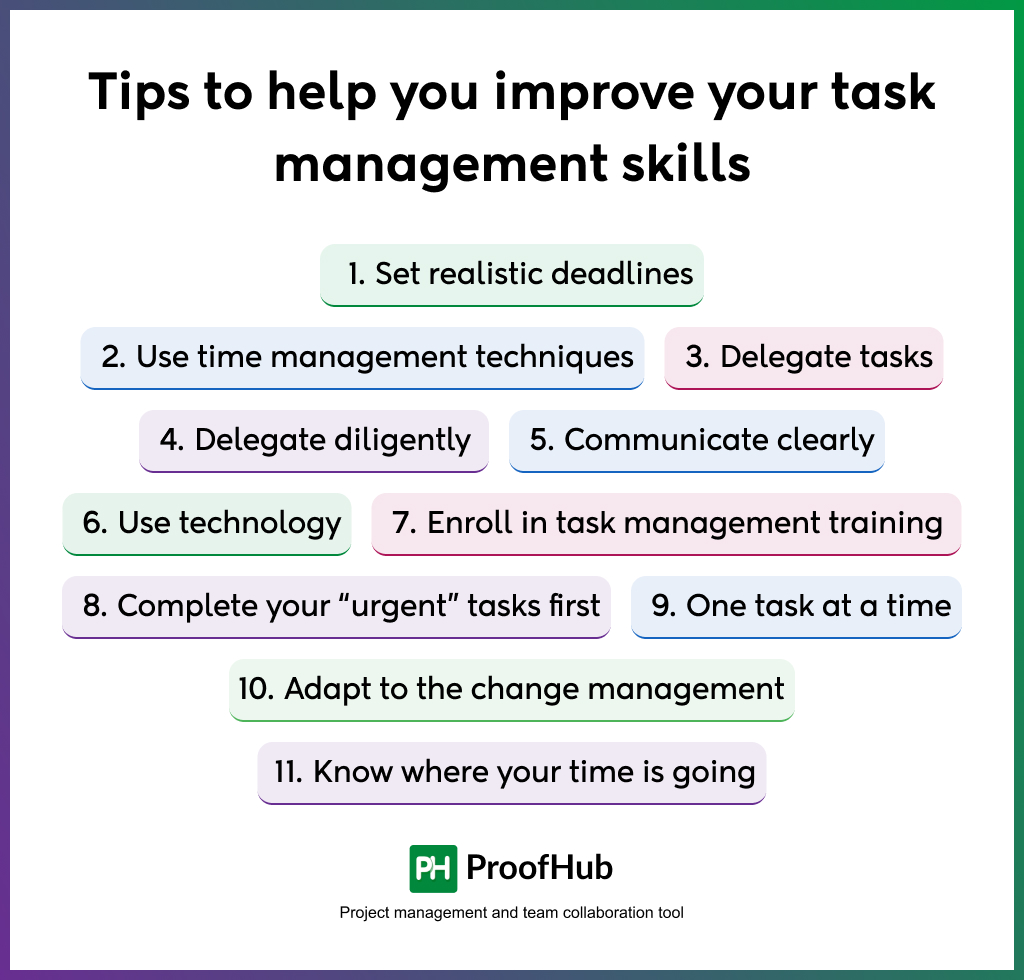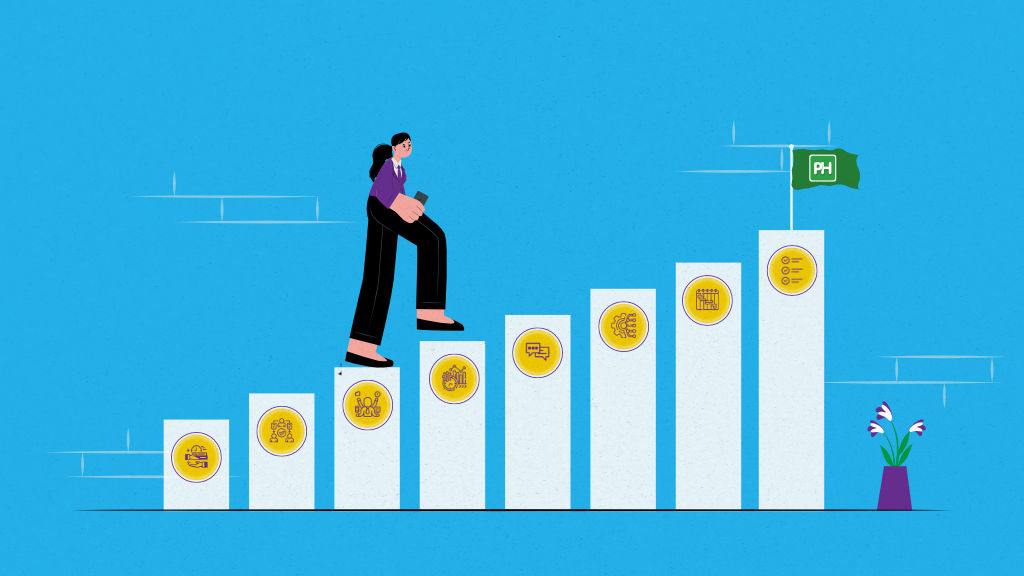Task management goes beyond simple to-do lists—it involves mastering essential skills like prioritization, delegation, decision-making, time management, problem-solving, and ensuring on-time delivery. If you’re a project manager aiming to boost your organization’s performance or empower your team, this article is for you. We’ll cover the key task management skills and share clear tips to enhance productivity and drive project success.
What are task management skills?
Task management skills is the ability to plan, delegate, and manage tasks better to complete them on time and within budget It includes learning skills such as planning, delegation, prioritization, time management, scheduling, communication, and decision-making.
These skills help you in various task management activities of a team such as allocating sufficient time to complete each task, deciding who is the best person in the team to do the task, and ensuring every task assignee has all the information and resources required to work on the task.
Top 9 task management skills examples
A manager has to manage the tasks of the team as well as their own tasks. Thus, a manager needs skills both for team task management and individual task management. Have a look at the examples of the top 9 task management skills a manager needs.

1. Planning
Planning is the most important task management skill for a manager. It includes breaking down large tasks into manageable tasks, estimating the time required for each task, setting the dependencies, and defining clear goals. To map out a path to success, a manager needs strong strategic planning.
2. Prioritization
There will always be tasks which are more essential than others. Prioritization is the ability to prioritize tasks based on urgency and importance. It includes creating a priority list of tasks to fulfill the project requirements in the given time.
3. Delegation
Delegation is the ability to delegate or assign tasks to others. For effective task delegation, a manager should be able to observe, analyze, and identify the strengths and weaknesses of team members, ensuring that work is done efficiently and effectively.
4. Observation and analysis
Observation and analysis are the ability to obtain information, analyze the data, and make informed decisions. This skill helps you analyze the strengths and weaknesses of team members, identifying areas for improvement and making rational decisions based on the facts.
5. Scheduling
Scheduling is the ability to create a schedule of tasks, define the order of tasks, and make sure each task has sufficient resources allocated. It helps you define the timeline of tasks, manage the time accordingly to complete tasks on time, and make full use of all the available resources.
6. Time management
Time management is the ability of a person to manage time effectively to complete tasks on time. It helps you create and manage a schedule of tasks to meet the deadlines. A manager needs to have good time management skills to ensure they can complete tasks on time and manage time efficiently.
7. Communication
Communication is the ability to share your ideas, thoughts, and messages clearly so that others can understand. Active listening is also part of communication because without patiently listening to others, you cannot understand others and respond appropriately. Good communication ensures you share task information with the team effectively and can clear their queries.
8. Organization
Being organized is a workplace skill that helps you improve productivity. It involves systematically arranging tasks, information, and resources. By grouping similar tasks and minimizing context switching, you can work towards streamlining workflows and enhancing efficiency.
9. Adaptability and flexibility
There is a likelihood that tasks and requirements can change unexpectedly. A manager should be adaptable in situations like these and be able to create a new time management plan to cater to sudden changes in requirements. A manager needs strong decision-making skills, persuasive communication, and an agile mindset to do it successfully.
What makes task management such an important skill for project managers?
Task management is among the main responsibilities of a project manager. It helps you complete tasks on time and budget with high quality and ensures the optimal utilization of organizational resources.
A manager with good task management skills can ensure a project team has well-planned tasks, sufficient time to complete tasks, the required information to complete the tasks, and a balanced workload.
Have a look at the reasons task management is an essential skill for any skilled project manager.

1. Ensures timely completion
Just having a to-do list of all your tasks and working randomly on them, without defining their importance, will not get the job done for you. This is where smart task management comes into play. Prioritizing tasks will help your team members understand which tasks are of high value and should be started immediately, with a singular focus.
Manage and prioritize your tasks efficiently, Read – How to prioritize tasks
2. Improves ‘project manager-team member’ communication
Communication loopholes and misunderstandings between team members and project managers can cost organizations big time. Task management facilitates smooth communication between project managers and team members as there’s a clear visualization of individual and group job responsibilities in a centralized location.
3. Improves job accountability
Task management ensures a clear distribution of job roles and responsibilities. Everyone knows what tasks they have to work on and when to start and complete them. There’s no scope for procrastination or shifting the blame on others for not being able to deliver work on time.
4. Improves job satisfaction
Task management lets project managers assign tasks based on employees’ availability, workload, and skillset. Task management improves job satisfaction among employees as they can work without heavy workloads, excessive stress, and potential burnout. As a result, they are more engaged and productive at work, which is a healthy sign for any organization.
5. Identify bottlenecks
Task management includes taking complete control of the tasks. When you create a task management plan and track the progress every day, it helps you identify bottlenecks as soon as they begin to develop. Thus, you can eliminate them before they impact the project.
How to improve task management skills?
“Failure is simply the opportunity to begin again, this time more intelligently.” – Henry Ford
A decent share of managers struggle with task management of a team and managing their own tasks despite spending more time at their desks. Thus, you need to work on improving your task management skills to manage tasks for your team and yourself effectively.
Here are 11 actionable tips to help you improve your task management skills to get more done in less time:

1. Set realistic deadlines
Most of the time managers are not able to set realistic deadlines for the tasks because of the planning fallacy. Be aware of this fact and set realistic deadlines. The best way to do this is to involve the team members in calculating the estimated time for tasks, use data from similar projects in the past, and exercise expert judgment.
2. Use time management techniques
Task batching is a technique of grouping similar tasks together.
Time blocking is a technique of dividing your day into blocks of time and dedicating each block to a specific task or group of tasks.
The Pareto Principle says 80% of consequences come from 20% of the causes.
The Eisenhower Matrix is a technique to organize and prioritize tasks by urgency and importance in the four categories:
- Urgent & Important (Do it)
- Not Urgent & Important (Schedule it)
- Urgent & Not Important (Delegate it)
- Not Urgent & Not Important (Delete it)
Using these techniques in combination ensures you do not waste time on switching from one task to another, spend less time on doing similar tasks, and work on the most important tasks first.
3. Delegate tasks
You’re not supposed to do everything by yourself. Delegate some of your tasks to your team members to make your task list less overwhelming. Choose the tasks that can be delegated so that you can work on strategic or high-value tasks. Practicing this not only relieves your workload but also boosts your employees’ morale as they get more opportunities to grow.
4. Delegate diligently
There are certain rules you need to follow when delegating tasks. A simple rule is if someone can do the task 70% as well as you, you can delegate that task. Similarly, you do not delegate tasks to the person who has the most time, but to the most eligible one. Delegate your tasks diligently.
5. Communicate clearly
86% of employees and executives cite the lack of effective communication as one of the main causes of failures in the workplace, especially the remote work employees.
This is how important good communication is to help you and your team improve the quality of work and deliver tasks on time, with minimal errors.
Effective communication enables you to share ideas, feedback, updates, or concerns with team members when delegating tasks. You can use communication and collaboration tools like chat, discussions, and video conferencing to prevent miscommunication and ensure no important pieces of information fall through the cracks.
Read more: How you can sharpen your non-verbal communication skills
6. Use technology such as task management software
Technology can make it easy to manage tasks for your team and your personal to-do list. There is a vast range of task management software in the market that can help you create, plan, delegate, schedule, track, and manage tasks.
Task management software brings all of the tasks of a team to one place. It provides you with enhanced visibility into task schedules and workload distribution. You can track the progress of tasks from a single centralized place to identify bottlenecks and take complete control over tasks.
7. Enroll in professional task management training
With persistent efforts in the right direction, you can make improvements in your task management skills. One effective way to do so is to explore the task management training courses and find good mentorship.
Probably, there are chances that you may not find the direct task management training course at first. So, try searching for time management and project management training courses.
8. Complete your “urgent” tasks first
When starting work in the morning, it’s easy for many people to pick small, less important tasks over more challenging ones because they don’t want to barge straight into difficult tasks.
I suggest you do the opposite.
When starting work in the morning, identify the assignment you’re dreading, a project with the nearest deadline, or a high-priority task that’s giving you the jitters. It’s not easy, but this method is going to help you big time.
Tell yourself it’s just another task you need to do and the rest of the day will be better after taking it out from your to-do list.
By attempting and completing the most challenging task first, you’ll have more time to focus on other tasks that are relatively easy and straightforward.
9. One task at a time
When you divide your attention between tasks, it adversely affects your quality of work. Juggling various tasks at the same time does not make you more productive. Only 2.5% of people can multitask effectively.
Focusing on one task at a time is also called single-tasking. It helps you avoid feeling overwhelmed and stressed. Your quality of work improves as you complete your tasks with minimal errors.
If you have a big task at hand, you can break it down into smaller tasks and tick them off one by one while tracking the time taken to complete each task.
10. Adapt to the change management
No matter how well you plan projects, there’s always a chance of sudden changes put up by the client. This is where you need to be adept in change management, which makes you and your team respond to task changes on time and keep your project on track. Change management necessitates creating and executing contingency plans while keeping your team members in the loop.
11. Know where your time is going
If you don’t keep track of where you and your team are investing your working time and missing deadlines, it is hard to know whether you are utilizing your time effectively..
Using a good time-tracking tool improves your time management skills as you can record the time spent on completing different tasks. You can also set time estimates for tasks and compare them with the actual time logged to perform these tasks. If the time taken exceeds the estimated time, you can discover the reasons for the deviation.
Time tracking also helps you to monitor the present performance, alongside comparing the past performance of your employees. Have they got better at performing certain tasks quicker than before, or do they need to improve on it?
I hope these tips help you in improving your task management skills. Now, let’s understand how task management software can make life easy for you.
ProofHub: a task management software to help you with task management
With ProofHub task management:
- You can create tasks and delegate them to the team members. Yes, you do not need an email, notepad, or a spreadsheet-based to-do list. Within a few simple clicks, you can do everything from one place
- You can add any information you want to add to the tasks such as start and due dates, priority labels, estimated time, estimated budget, task ID, task attachments, and multiple task assignees
- You can break a project into tasks, create a workflow, and visualize the project plan on a Gantt chart. This helps you set the order of the tasks, allocate resources, and highlight the most critical tasks in the project
- You can view the team tasks at a glance in multiple views including Kanban and Calendar to take control and manage tasks easily
- You can communicate on tasks directly with task comments and share files in an organized manner with task attachments. This avoids miscommunication and misunderstandings
- You can track the real-time progress of tasks and take complete control of team task management with various project reports and native time tracking. ProofHub offers reports by Project status, Task completion, Resource utilization, Time utilization, and Time logged
- You can use the agenda to visualize what you need to work on ‘Today’ and what tasks are ‘Upcoming’ and ‘Overdue’
- You can use sticky notes or project notes to create a personal to-do list of tasks and keep track of it
- You can review, edit, and share feedback on the task documents using online proofing
Conclusion
Task management is the most important duty of the project manager. This is because the success of the project depends on effective task management. I agree all project management professionals are good at task management. It is something beyond just the technical aspect of work. At the same time, the good news is one can improve task management skills at any point.
With the right knowledge and training in place, you can gradually build the skills required to effectively plan, create, delegate, monitor, and manage tasks.
With the tips shared in this post, you can start your journey to improvement. Once improved, you can use the best techniques and advanced task management tools like ProofHub to master task management for your team and yourself.
Related articles:
- What is task management? A comprehensive guide
- 28 Project management skills a project manager must have
- 17 Best task management apps – Keep your business on track
FAQs
What are the 5 Ds of task management?
The 5 Ds of task management are: Do, Delegate, Defer, Diminish, and Delete. Based on the urgency and importance of the tasks, it suggests the action for the tasks. The purpose is to complete tasks on time and make full use of resources.
What are the best tactics for task management?
The best tactics for task management are to build your task management skills, use task management and time management techniques, and utilize task management software like ProofHub. Depending on the experience and expertise of your team, you can also involve them in task management.
What are the benefits of task management skills in the workplace?
Having good task management skills in the workplace helps you plan your work better, utilize the available resources efficiently and effectively, and complete the tasks on time and within budget. It also provides everyone the clarity of role and enhances data organization which in turn leads to improved accountability and reduced conflicts.
How can project managers improve their task management skills?
Project managers can improve their task management skills by improving their knowledge, enrolling in training courses, and practicing task management for more and more projects. This will help them improve their task management skills over time.
How do task management tools help in improving task management skills?
Task management tools help in improving task management skills by facilitating you to create, plan, delegate, monitor, and manage tasks. Task management software provides you with a wide range of features to help you manage the tasks of a team effectively and easily.

